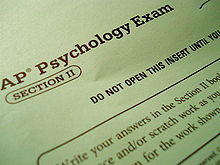The Advanced Placement Psychology (AP Psychology, AP Psych, or APPSY) course and corresponding exam are part of College Board's Advanced Placement Program. This course is tailored for students interested in the field of psychology and as an opportunity to earn Advanced Placement credit or exemption from a college-level psychology course. It was the shortest AP exam until the AP Physics C exam was split into two separate exams in 2006.
AP Psychology is often considered one of the easier AP exams; relative to the other tests, the material is rather straightforward and much easier to self-study. Among all the social studies Advanced Placement exams, the Psych exam had the second-highest passing rate in 2018.[1]
Topics covered
The College Board provides a course of study to help educators prepare their students for the AP Psychology exam. The exam covers the following 14 areas. The percentage indicates the portion of the multiple-choice section of the exam focused on each content area:[2]
| Topic | Percent |
|---|---|
| History and Approaches | 2-4% |
| Research Methods | 8-10% |
| Biological Bases of Behavior | 8-10% |
| Sensation and Perception | 6-8% |
| States of Consciousness | 2-4% |
| Learning | 7-9% |
| Cognition | 8-10% |
| Motivation and Emotion | 6-8% |
| Developmental Psychology | 7-9% |
| Personality | 5-7% |
| Testing and Individual Differences | 5-7% |
| Abnormal Psychology | 7-9% |
| Treatment of Psychological Disorders | 5-7% |
| Social Psychology | 8-10% |
Exam
The exam includes two sections: a 70-minute multiple choice section (100 questions) and a 50-minute free response section (2 prompts). The multiple choice provides two-thirds of the grade and the free-response provides the remaining third.[3]
Beginning with the May 2011 AP Exam administration, total scores on the multiple-choice section are based only on the number of questions answered correctly. Points are no longer deducted for incorrect answers. Grading (the number of points needed to get a certain score) is slightly more strict as a result.
Grade distribution
The exam was first held in 1992. Grade distributions for the Psychology exam scores since 2010 were:
| Score | 2010[4] | 2011[5] | 2012[6] | 2013[7] | 2014[8] | 2015[9] | 2016[10] | 2017[11] | 2018[12] | 2019[13] | 2020[14] |
|---|---|---|---|---|---|---|---|---|---|---|---|
| 5 | 19.6% | 20.1% | 20.7% | 21.2% | 18.7% | 20.1% | 19% | 18.8% | 21.1% | 20.2% | 22.3% |
| 4 | 26.6% | 26.3% | 26.0% | 26.6% | 26.9% | 26.2% | 26.1% | 25.5% | 26.3% | 25.4% | 25.3 % |
| 3 | 20.0% | 19.8% | 19.4% | 19.5% | 19.9% | 19.9% | 19.1% | 20.1% | 18.3% | 18.8% | 23.4 % |
| 2 | 12.7% | 12.9% | 13.5% | 13.0% | 13.5% | 13.1% | 14.2% | 14.7% | 14.5% | 13.7% | 9.6 % |
| 1 | 21.1% | 20.9% | 20.3% | 19.7% | 20.9% | 20.7% | 21.6% | 21.2% | 19.8% | 22.0% | 19.4 % |
| % of Scores 3 or higher | 66.2% | 66.2% | 66.1% | 67.3% | 65.5% | 66.2% | 64.2% | 64.4% | 65.7% | 64.4% | 71.0% |
| Mean | 3.11 | 3.12 | 3.13 | 3.17 | 3.09 | 3.12 | 3.07 | 3.07 | 3.14 | 3.08 | 3.22 |
| Standard Deviation | 1.42 | 1.42 | 1.42 | 1.42 | 1.41 | 1.42 | 1.42 | 1.41 | 1.42 | 1.44 | 1.40 |
| Number of Students | 177,708 | 197,719 | 220,361 | 238,962 | 259,789 | 276,971 | 293,350 | 302,369 |
References
Notes
- ^ Edwards, Halle. "Complete List of AP Courses and Tests". blog.prepscholar.com. Retrieved 2019-04-08.
- ^ "AP: Psychology". Archived from the original on 2008-04-02. Retrieved 2008-04-05.
- ^ "AP: Psychology". Archived from the original on 2008-01-28. Retrieved 2008-04-05.
- ^ 2010 AP Scores Distribution
- ^ 2011 AP Scores Distribution
- ^ 2012 AP Scores Distribution
- ^ 2013 AP Scores Distribution
- ^ 2014 AP Scores Distribution
- ^ 2015 AP Exam Score Distributions
- ^ Total Registration. "2016 AP Exam Score Distributions". www.totalregistration.net. Retrieved 2016-07-01.
- ^ "2017 AP Exam Score Distributions".
- ^ Total Registration. "2018 AP Exam Score Distributions". www.totalregistration.net. Retrieved 2019-06-22.
- ^ Total Registration (June 21, 2019). "2019 AP Exam Score Distributions". www.totalregistration.net. Retrieved 2019-06-22.
- ^ Total Registration (2020-07-10). "2020 AP Exam Score Distributions". www.totalregistration.net. Retrieved 2020-07-10.
